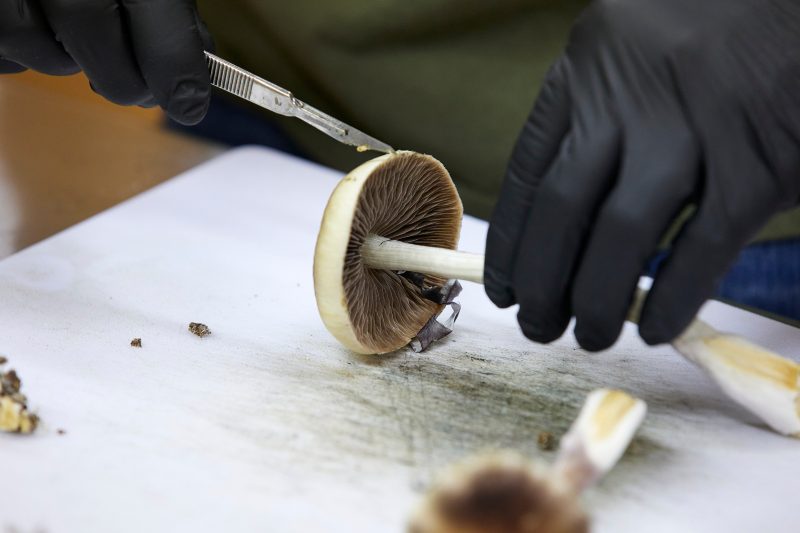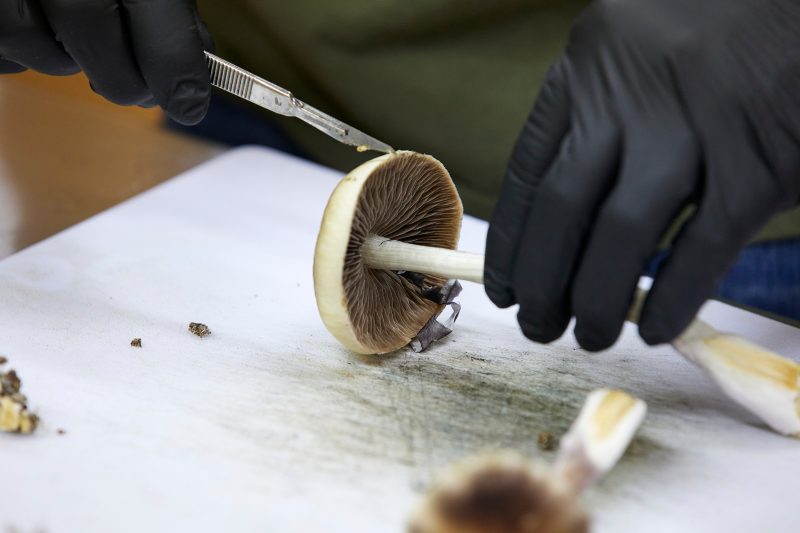
The days of Timothy Leary promoting psychedelic drugs with the 1960s refrain “turn on, tune in, drop out” are long gone.
But now, the much criticized, late Harvard psychologist’s idea that mind-altering substances could be helpful and legitimate psychological tools is more relevant than ever.
Psychedelics are becoming so mainstream that the Department of Veterans Affairs is examining the use of MDMA — also known as ecstasy — and psilocybin, the active ingredient in psychedelic mushrooms, to fight post-traumatic stress disorder (PTSD) and depression.
The point is to make veterans well, not high on hallucinogens.
A 2021 peer-reviewed study published by Nature Medicine found 67 percent of participants using MDMA “no longer met the diagnostic criteria for PTSD,” compared with 32 percent who took placebos.
“Our nation’s Veterans deserve the very best care, and VA is constantly supporting innovations to deliver that,” said VA Secretary Denis McDonough’s announcement last month of a new psychedelic research program. “This is an important step to explore the efficacy of a potential new set of promising treatments that could improve the health and quality of life for veterans.”
Agency researchers previously conducted small psychedelic studies, according to the department. “Through this new research opportunity, VA intends to gather definitive scientific evidence on the potential efficacy and safety of psychedelic compounds,” a department statement said, “when used in conjunction with psychotherapy to treat Veterans with PTSD and depression. This is the first time since the 1960s that VA is funding research on such compounds.”
VA is inviting scientists to submit preliminary applications, now through April 1, for research into the use of drugs like MDMA and psilocybin to treat ailments, along with psychotherapy.
They won’t lack testimonials from vets who have already benefited from psychedelic therapy.
One is Juliana Mercer of San Diego, a 16-year Marine Corps veteran with service in Iraq and Afghanistan and director of veteran advocacy and public policy for Healing Breakthrough, which promotes VA use of MDMA-assisted therapy.
Common labels like magic mushrooms for psilocybin and X for MDMA detract from the developing science and the real therapeutic value the drugs provide for vets like Mercer, a retired staff sergeant. Psychedelics, when used with controlled talk therapy, can do wonders for those who suffer.
Just one experience with psilocybin at a Mexican retreat center “provided relief and almost overnight healing” for Mercer after two decades of emotional trauma.
But, importantly, it’s not the drug alone. “Without the work that I did with the therapist,” Mercer, 41, said by phone, “I truly don’t believe that it would have had the lasting power that it has.”
Psilocybin helped her “access the grief that I had collected over 20 years of conflict,” she said, “of me being at war, my country being at war, my friends being at war, working with the wounded population and really seeing the true cost of war, every single day during my 20s and 30s.”
Those feelings were “kind of trapped inside of me, and they had accumulated to the point where I was not okay,” she added. Using psilocybin to help her release those emotions allowed Mercer “to reconnect to peace and the joyful, loving, authentic, self that had previously been kind of inundated with pain and trauma and grief.”
Lauren Myers, a retired Air Force major and pilot in Monterey, Calif., took psilocybin twice, “in a country where it’s legal, but unregulated” and credits it with saving her marriage to a Navy SEAL. “It helped me with anxiety and depression,” she said. “I feel calmer, more even keeled.” Myers, 47, is director of women’s programs for Veterans Exploring Treatment Solutions (VETS), which advocates psychedelic-assisted care.
Like Mercer, Myers emphasized the importance of using psychedelics only in controlled situations, including talk therapy. “The work begins before ever taking the psilocybin,” she said. “Ideally, you work with a coach for a few sessions before going through the experience. The medicine is a small piece of it.”
In December, MAPS Public Benefit Corp., a for-profit affiliate of the Multidisciplinary Association for Psychedelic Studies, asked the Food and Drug Administration (FDA) to approve MDMA for PTSD treatment. It and psilocybin are classified by the Drug Enforcement Administration (DEA) as schedule 1 substances, meaning they have “a high potential for abuse.” FDA declared psilocybin a “breakthrough therapy” in 2018, a designation that allows expedited development of drugs.
DEA referred questions to FDA, which said it has not approved or evaluated the effectiveness and safety of any psilocybin or MDMA product “for any therapeutic indication.”
FDA, however, also said “psychedelic drugs show initial promise as potential treatments for PTSD and mood, anxiety and substance use disorders” but they remain in the investigational stage.
“We believe that this United States government has a duty, an obligation to turn over every stone in the pursuit of finding something more effective for the women and men who come back forever changed from service,” said Matt Saintsing, a spokesman for the Disabled American Veterans (DAV).
Promising psychedelic research in the 1960s ended, he said, with the national war on drugs in the 1970s. Now, the research is on again, but Saintsing said, “we lost half a century’s worth of psychedelic science … over like cultural hang-ups.”
Hang-ups over psychedelics apparently are no longer a problem, perhaps surprisingly, with politicians on Capitol Hill.
“I have not heard of any opposition,” said Naomi Mathis, DAV’s assistant national legislative director. “I would have thought that there would have been, but no, all the conversations we have had have all been pretty positive.”
The lack of political opposition eases the way for research that once would have been too controversial to pursue.
“Veterans and VA researchers have told us about the potential promise of psychedelics to treat mental health conditions for some time,” said Shereef Elnahal, VA’s undersecretary for health. “Now is our chance to study this potential method of treating Veterans with PTSD and major depression across the country.”

